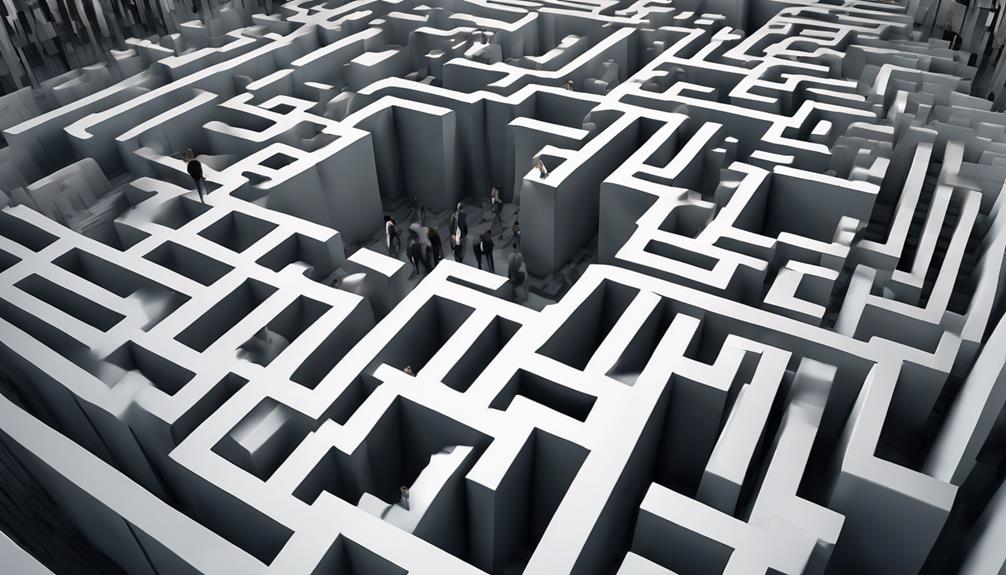As we delve deeper into the narcissists’ ego games, we are faced with a mirror that not only reflects their exaggerated self-importance but also the complex power dynamics they participate in.
These individuals craftily maneuver through social interactions, employing tactics that mask their vulnerabilities and fears beneath a facade of grandiosity.
The allure of unraveling the complexities of their behavior lies in understanding the underlying motivations that drive these ego games, offering a glimpse into the psychology of manipulation and control wielded by those ensnared in the web of narcissism.
Key Takeaways
- Narcissists use projection to deflect accountability and maintain power.
- Ego games reinforce their superiority and control mechanisms.
- Denial and rationalization shield them from criticism and self-reflection.
- Fragile self-esteem drives manipulative behaviors and avoidance of criticism.
Understanding Narcissistic Power Dynamics
Navigating the intricate web of narcissistic power dynamics reveals a complex interplay of dominance, ego gratification, and control mechanisms. In the realm of narcissistic behavior, asserting dominance isn't merely about being in control; it's a strategic move to maintain power and superiority.
By walking ahead of others, narcissists showcase their perceived importance and create a physical representation of their elevated status. This act feeds their insatiable ego, reinforcing their belief in their inherent superiority.
Furthermore, the aversion to answering questions serves as a shield against potential challenges to their authority. It's through these calculated actions that narcissists construct and uphold a façade of invincibility, manipulating situations to align with their distorted self-image.
Unmasking Projection Behavior in Narcissists

Projection behavior in narcissists serves as a strategic tool for deflecting attention, shifting blame, and bolstering their fragile ego. By accusing others of the very traits they possess, narcissists create a smokescreen to avoid scrutiny and accountability. This manipulation tactic allows them to maintain a facade of perfection while projecting their insecurities onto others. The table below highlights key aspects of projection behavior in narcissists:
| Projection Behavior | Purpose | Outcome |
|---|---|---|
| Blaming Others | Deflecting Attention | Avoiding Accountability |
| Shifting Fault | Avoiding Blame | Protecting Fragile Ego |
| Accusing Others | Maintaining Superiority | Discrediting Potential Critics |
Understanding these behaviors can shed light on the complex mechanisms at play in the narcissistic mind.
Levels of Self-Awareness in Narcissistic Individuals
In understanding narcissistic individuals, varying levels of self-awareness play a crucial role in shaping their behavior and interactions with others. Some narcissists exhibit a high degree of self-awareness, consciously manipulating situations to serve their own interests. They're adept at justifying their actions, often blurring the lines between reality and their idealized self-image.
On the other hand, many narcissists lack empathy, which can cloud their understanding of the impact of their behavior on others. This lack of awareness leads them to deny responsibility for their actions and rationalize their behavior, further perpetuating their ego-driven patterns.
Analyzing Narcissistic Ego Games

Understanding the intricacies of narcissistic behavior sheds light on the manipulative tactics employed in their ego games. Narcissists engage in these ego games to maintain a sense of power, control, and superiority over others. By projecting an image of grandiosity and entitlement, they aim to manipulate situations to their advantage.
Walking ahead of others, avoiding questions, and projecting their insecurities onto others are all strategies used to feed their ego and assert dominance. These behaviors are carefully calculated to uphold their fragile self-image and deflect any potential threats to their perceived superiority.
Analyzing these ego games provides valuable insight into the deceptive and self-serving nature of narcissistic individuals, showcasing the depths they'll go to protect their inflated sense of self-worth.
Delving Into Narcissistic Coping Mechanisms
Exploring the coping mechanisms employed by narcissists offers a deeper understanding of their defensive strategies and self-preservation tactics. Denial, rationalization, and projection serve as key tools in their arsenal.
Denial allows them to negate any flaws or mistakes, preserving their self-image. Rationalization enables the justification of their behavior, often blaming external factors. Projection, accusing others of the very traits they possess, shifts focus away from their own shortcomings.
These mechanisms shield narcissists from accountability, shielding their fragile ego from criticism. By unraveling these coping strategies, we gain insight into the intricate ways in which narcissists navigate their world, safeguarding their sense of self-importance.
Decoding the Motivations Behind Narcissistic Behavior

Delving into the psyche of narcissists reveals a complex interplay of motivations driving their behavior patterns. At the core of their actions lies a deep-seated need for validation, admiration, and control. By asserting dominance and showcasing superiority, narcissists aim to feed their ego and maintain a sense of entitlement.
Avoiding questions serves to protect their carefully constructed facade and shield them from potential challenges to their authority. The fear of exposure and confrontation with uncomfortable truths drives their manipulative tendencies.
Understanding these underlying motivations sheds light on the intricate web of behaviors displayed by narcissists, offering insight into the complex interplay between their internal drives and external actions.
Revealing the Tactics of Narcissistic Manipulation

The intricate tactics employed by narcissists to manipulate situations and individuals reveal a calculated strategy aimed at maintaining control and preserving their fragile self-image. These individuals often employ gaslighting, a tactic where they distort reality to make their victims doubt their own perceptions.
By sowing seeds of confusion and doubt, narcissists gain power and control over others. Additionally, love bombing, a technique involving excessive praise and flattery at the beginning of a relationship, is used to manipulate and emotionally overwhelm their targets.
Through these manipulative tactics, narcissists exploit vulnerabilities, establish dominance, and ensure compliance from those around them. Understanding these strategies is crucial in recognizing and protecting oneself from falling victim to their manipulative behaviors.
Exploring the Fragile Ego of Narcissists

Amidst the intricate web of narcissistic behaviors lies a fragile ego waiting to be uncovered. Understanding the fragile ego of narcissists can shed light on their often perplexing actions. Here are three key insights into the fragile ego of narcissists:
- Constant Need for Validation: Beneath their facade of confidence, narcissists crave constant validation to maintain their inflated self-image.
- Fear of Rejection: Despite their outward arrogance, narcissists are deeply afraid of rejection, which can shatter their fragile sense of self-worth.
- Vulnerability to Criticism: Criticism, even if constructive, can be a severe blow to a narcissist's delicate ego, leading to defensive and aggressive responses.
Exploring these facets of the fragile ego can provide a deeper understanding of the complexities that drive narcissistic behaviors.
Strategies for Dealing With Narcissistic Individuals

When encountering narcissistic individuals, employing strategic communication tactics can help navigate challenging interactions effectively. It's crucial to maintain a calm and assertive demeanor while setting clear boundaries.
Avoid engaging in power struggles or questioning their authority directly, as this can escalate the situation. Instead, focus on active listening and validating their feelings without necessarily agreeing with their perspective.
By showing empathy and understanding, you can prevent conflicts and potentially defuse tense moments. It's also important to recognize manipulative behavior and not fall into their traps.
Setting limits on how much you engage with their ego games can safeguard your own mental well-being. Remember, self-care and seeking support from trusted individuals are vital when dealing with narcissistic individuals.
Frequently Asked Questions
How Do Narcissists Maintain Power Dynamics in Social Interactions?
In social interactions, we assert dominance by walking ahead, feeding our ego, and avoiding questions that challenge our authority. These actions help us maintain power, create distance, and uphold a facade of superiority.
What Are Some Subtle Signs of Projection Behavior in Narcissists?
When we observe narcissists projecting, they deflect attention, shift blame, and boost their egos. Accusing others of their own traits preempts criticism and reveals their insecurity. Such behavior reveals their fragile self-image, needing constant validation.
Can Narcissists Ever Develop a Genuine Sense of Self-Awareness?
Yes, we believe narcissists can develop genuine self-awareness. It requires introspection, therapy, and a willingness to confront uncomfortable truths. With effort and support, individuals on the narcissistic spectrum can cultivate empathy and understanding towards others.
How Do Narcissistic Ego Games Impact Their Relationships With Others?
In relationships, narcissistic ego games create power struggles, erode trust, and damage emotional bonds. They cultivate an environment of manipulation, insecurity, and control. These dynamics poison connections, leaving wounds that may never fully heal.
What Are Some Lesser-Known Coping Mechanisms That Narcissists Use to Protect Their Self-Image?
When protecting their self-image, narcissists often employ subtle tactics like gaslighting, silent treatment, or playing the victim. These mechanisms help maintain their facade of superiority, deflect criticism, and manipulate others to serve their needs.
How Do Narcissists’ Ego Games Tie in with Their Reactions to No Contact?
Narcissists’ reactions to no contact can be extreme. They may use ego games to manipulate and regain control. Gaslighting, smear campaigns, and hoovering are common tactics. These behaviors are designed to make the victim doubt themselves and break no contact. Understanding these patterns is critical for self-protection.
Conclusion
In our journey through the labyrinth of narcissistic behavior, we've uncovered the intricate web of ego games played by individuals seeking power and dominance.
Like a master puppeteer pulling invisible strings, narcissists manipulate those around them to maintain their facade of superiority.
As we peel back the layers of their motivations and coping mechanisms, we reveal a fragile ego desperate for validation.
Understanding these tactics is key to navigating the complex dance of narcissistic relationships.









